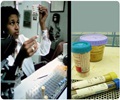A new study has found that care provided to patients with fecal incontinence may cost more than $4,100 per patient every year in terms of both medical and non medical costs.

"Very few studies have looked at the cost of this embarrassing and socially-isolating condition," says the study's senior author Dee E. Fenner, M.D., the Harold A. Furlong Professor of Women's Health and Co-Director of the Michigan Bowel Control Program. The Michigan Bowel Control Program combines the expertise of Urogynecologists, Gastroenterologists, Colorectal surgeons and expert nurses to care for patients with complex defecation disorders, including fecal incontinence.
"The disease is prevalent among men and women, and this study shows the cost is a significant burden to patients and to society. We want to make sure it is not forgotten in the discussions about health care dollars."
The condition usually involves unintentional loss of solid, liquid or mucous stool, and it affects 8.3 percent of adults who are not living in an institution like a nursing home. It is equally prevalent in women and men, and the prevalence increases significantly with age.
Among women in their 80s, research shows about 15 percent report monthly bouts of fecal incontinence, says Fenner, who also is Professor of Obstetrics and Gynecology and Urology.
In the study, the researchers included three categories of cost: direct medical cost (diagnosis, treatment and management of the condition); direct non-medical cost (costs of non-medical resources like protective products or transportation to care); and indirect cost (loss of productivity).
Advertisement
Those who suffer with fecal incontinence find it difficult to hide odor issues, and the condition can lead to depression and social isolation. Many suffer for five years or more before seeking treatment options, Fenner says.
Advertisement
"This study shows that more attention should be directed to the prevention of this condition," Fenner says. "In addition, interventions that can help patients manage their symptoms could generate financial benefits as well, because the results show that patients with more severe incontinence also have higher annual costs of care."
Source-Eurekalert














